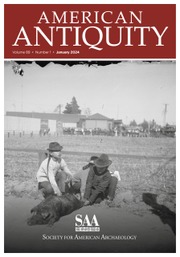This issue of American Antiquity is significant in many ways. It comes out in the midst of a COVID-19 pandemic, the Black Lives Matter movement, uncontrolled fires in the West, and more frequent and destructive storms. We are experiencing rapid social shifts and dramatic effects of climate change. Many articles in this issue are noteworthy, but two, in addition to the “Statement and Commitments from SAA Editors,” are of special relevance to today's challenges. Tim Kohler and Marcy Rockman's “Forum” brings to the forefront the Intergovernmental Panel on Climate Change, a global organization that is leading research about the effects of the changing climate on economic and social institutions and strategies to address these impacts. Kohler and Rockman propose direct approaches that archaeologists can take to make significant contributions to the many efforts by scientists from multiple disciplines on this committee. As their article demonstrates, archaeologists need to continue to conscientiously work with international leaders and specialists in addressing contemporary issues where we have considerable expertise and knowledge.
This leads to a second article that is also of major relevance today, written by Maria Franklin and Samuel Wilson, on a bioarchaeological study of African Americans’ health in the post emancipation South. Although the Black Lives Matter movement began following the death of Trayvon Martin in 2013, with the death of George Floyd in Minneapolis at the end of May 2020 it expanded into an international recognition that dynamic and rapid actions needed to take place to affect meaningful change. This is why the editors of the SAA publications wrote a statement and action plan that is published in the current issue. The submission of Franklin and Wilson's substantial study came in late last fall, prior to the 2020 events of today's international movement. When I first saw the topic of their paper, I wondered if it would be a better fit for a journal specializing in historical archaeology. Then I read it and saw that it was not only a significant contribution to bioarchaeology but also a reflection on the deeply ingrained health disparities in the United States. The reviewers also recognized its relevance to the audience of American Antiquity. Although it is a coincidence that this paper was submitted right before the international movement expanded, we are pleased to feature this as our lead article in the current issue. Join me in acknowledging these authors’ contributions and reading their thoughts during these unsettled times.


